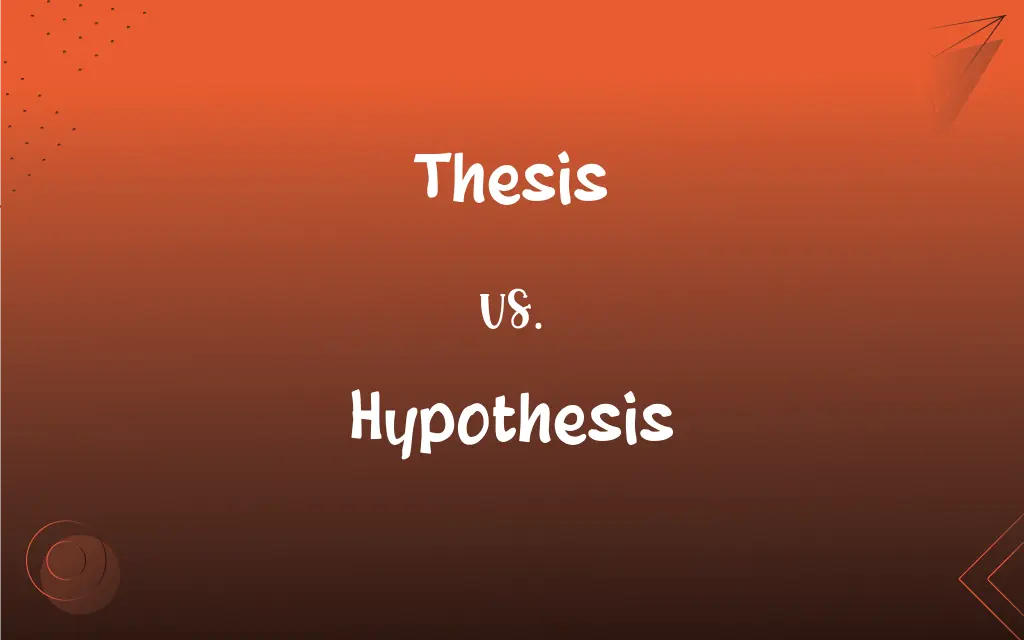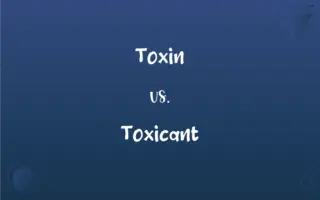Thesis vs. Hypothesis: What's the Difference?
Edited by Aimie Carlson || By Janet White || Published on November 25, 2023
A thesis is a proven statement used as a premise; a hypothesis is an assumption subject to testing."

Key Differences
A "thesis" is a statement or theory that is put forward as a premise to be maintained or proved, typically a position a student proposes to defend in a thesis (long essay/dissertation). Conversely, a "hypothesis" is a supposition or proposed explanation made on the basis of limited evidence as a starting point for further investigation.
A "thesis" demands substantial evidence or analysis for validation and is central to a dissertation or essay, guiding its direction and purpose. On the other hand, a "hypothesis" is speculative, anticipating that future research or experimentation might support it.
The term "thesis" is often associated with large-scale research projects, like a doctoral thesis, where significant original research is documented and analyzed. In contrast, a "hypothesis" can be part of various scientific endeavors, forming the basis for experiments designed to test its validity.
In academic contexts, a "thesis" represents the culmination of a student's research and study in an area, signifying mastery in the subject. A "hypothesis," however, is often the starting point of scientific research, leading to experiments that confirm or refute it.
While a "thesis" is usually public and defended in front of an academic committee, a "hypothesis" undergoes a more private process of verification, through experiments and peer review, before being accepted or rejected.
ADVERTISEMENT
Comparison Chart
Definition
Proven statement for a premise
Assumption for testing
Role
Conclusion of research
Basis for further research
Evidence
Requires substantial proof or analysis
Formed with limited evidence
Context
Long essays, dissertations
Scientific experiments, research
Verification
Public defense
Experiments, peer review
ADVERTISEMENT
Thesis and Hypothesis Definitions
Thesis
Academic position
His thesis was that the policy would fail.
Hypothesis
Speculative assumption
The scientist's hypothesis involved solar radiation levels.
Thesis
Educational milestone
Defending her thesis was a significant academic achievement.
Hypothesis
Research basis
Her hypothesis was that the drug would slow the disease.
Thesis
Research conclusion
Her thesis on climate change was groundbreaking.
Hypothesis
Theory to be tested
The hypothesis led to a major study in human behavior.
Thesis
Argument basis
The author's main thesis was not convincing.
Hypothesis
Scientific guess
Their hypothesis aligned with the observed phenomena.
Thesis
In-depth study
His thesis provided a new perspective on the issue.
Hypothesis
A tentative explanation for an observation, phenomenon, or scientific problem that can be tested by further investigation.
Thesis
A proposition that is maintained by argument.
Hypothesis
Something taken to be true for the purpose of argument or investigation; an assumption.
Thesis
A dissertation advancing an original point of view as a result of research, especially as a requirement for an academic degree.
Hypothesis
The antecedent of a conditional statement.
Thesis
A hypothetical proposition, especially one put forth without proof.
Hypothesis
(sciences) Used loosely, a tentative conjecture explaining an observation, phenomenon or scientific problem that can be tested by further observation, investigation and/or experimentation. As a scientific term of art, see the attached quotation. Compare to theory, and quotation given there.
Thesis
The first stage of the Hegelian dialectic process.
Hypothesis
(general) An assumption taken to be true for the purpose of argument or investigation.
Thesis
The long or accented part of a metrical foot, especially in quantitative verse.
Hypothesis
(grammar) The antecedent of a conditional statement.
Thesis
The unaccented or short part of a metrical foot, especially in accentual verse.
Hypothesis
A supposition; a proposition or principle which is supposed or taken for granted, in order to draw a conclusion or inference for proof of the point in question; something not proved, but assumed for the purpose of argument, or to account for a fact or an occurrence; as, the hypothesis that head winds detain an overdue steamer.
An hypothesis being a mere supposition, there are no other limits to hypotheses than those of the human imagination.
Thesis
(Music) The accented section of a measure.
Hypothesis
A tentative theory or supposition provisionally adopted to explain certain facts, and to guide in the investigation of others; hence, frequently called a working hypothesis.
Thesis
Senses relating to logic, rhetoric, etc.
Hypothesis
A proposal intended to explain certain facts or observations
Thesis
(rhetoric) A proposition or statement supported by arguments.
Hypothesis
A tentative theory about the natural world; a concept that is not yet verified but that if true would explain certain facts or phenomena;
A scientific hypothesis that survives experimental testing becomes a scientific theory
He proposed a fresh theory of alkalis that later was accepted in chemical practices
Thesis
(by extension) A lengthy essay written to establish the validity of a thesis (sense 1.1), especially one submitted in order to complete the requirements for a non-doctoral degree in the US and a doctoral degree in the UK; a dissertation.
Hypothesis
A message expressing an opinion based on incomplete evidence
Thesis
A conjecture, especially one too vague to be formally stated or verified but useful as a working convention.
Hypothesis
Pre-experimental proposal
Based on limited data, his hypothesis was bold.
Thesis
(logic) An affirmation, or distinction from a supposition or hypothesis.
Thesis
(philosophy) In the dialectical method of Georg Wilhelm Friedrich Hegel: the initial stage of reasoning where a formal statement of a point is developed; this is followed by antithesis and synthesis.
Thesis
Senses relating to music and prosody.
Thesis
The action of lowering the hand or bringing down the foot when indicating a rhythm; hence, an accented part of a measure of music or verse indicated by this action; an ictus, a stress.
Thesis
A depression of the voice when pronouncing a syllables of a word; hence, the unstressed part of the metrical foot of a verse upon which such a depression falls, or an unaccented musical note.
Thesis
A position or proposition which a person advances and offers to maintain, or which is actually maintained by argument.
Thesis
Hence, an essay or dissertation written upon specific or definite theme; especially, an essay presented by a candidate for a diploma or degree.
I told them of the grave, becoming, and sublime deportment they should assume upon this mystical occasion, and read them two homilies and a thesis of my own composing, to prepare them.
Thesis
An affirmation, or distinction from a supposition or hypothesis.
Thesis
The accented part of the measure, expressed by the downward beat; - the opposite of arsis.
Thesis
The depression of the voice in pronouncing the syllables of a word.
Thesis
An unproved statement put forward as a premise in an argument
Thesis
A treatise advancing a new point of view resulting from research; usually a requirement for an advanced academic degree
FAQs
Is a thesis subjective?
It's based on research but starts from a subjective proposition.
Can a thesis be a question?
Typically, a thesis is a statement, not a question.
Who verifies a hypothesis?
Typically, the scientific community through peer review.
Who writes a thesis?
Students, usually at the graduate level.
Can a hypothesis be proven?
It can be supported or refuted through research.
Does a thesis require research?
Yes, substantial research and evidence are crucial.
What's a thesis statement?
It's the central argument or point of a paper.
What forms a good hypothesis?
Clarity, testability, and relevance to existing research.
Is a hypothesis always true?
No, it's a proposition to be tested.
Can a thesis change during research?
It can evolve, but major changes might require reevaluation.
How broad can a hypothesis be?
It should be specific enough to be testable.
Is defending a thesis challenging?
It can be, as it requires deep knowledge of the subject.
Is every thesis published?
Not all, but many are, especially if significant.
How long is a thesis?
Varies greatly, often upwards of 80-100 pages.
What if research contradicts my hypothesis?
It's part of the scientific process and prompts further questions.
Why is a thesis important?
It contributes new knowledge or perspectives.
Are hypotheses guaranteed to progress science?
No, but they're crucial starting points for investigation.
Is there risk in a hypothesis?
It's speculative, so there's a risk it may not be supported.
Can a hypothesis lead to a theory?
If consistently supported over time, it might.
What's a null hypothesis?
It proposes no effect or relationship, to be tested against.
About Author
Written by
Janet WhiteJanet White has been an esteemed writer and blogger for Difference Wiki. Holding a Master's degree in Science and Medical Journalism from the prestigious Boston University, she has consistently demonstrated her expertise and passion for her field. When she's not immersed in her work, Janet relishes her time exercising, delving into a good book, and cherishing moments with friends and family.
Edited by
Aimie CarlsonAimie Carlson, holding a master's degree in English literature, is a fervent English language enthusiast. She lends her writing talents to Difference Wiki, a prominent website that specializes in comparisons, offering readers insightful analyses that both captivate and inform.






































































